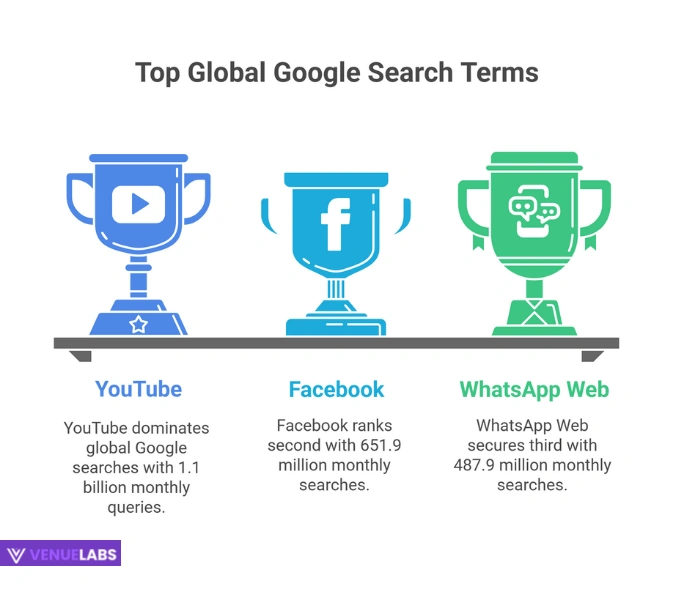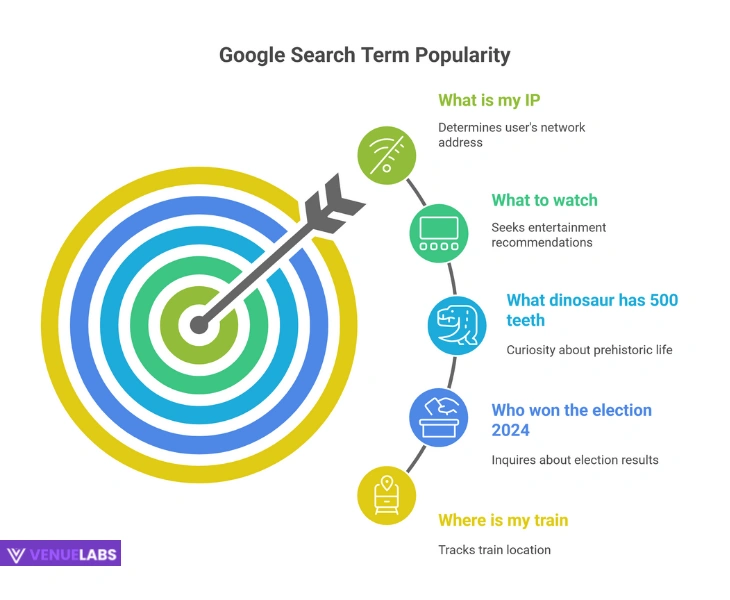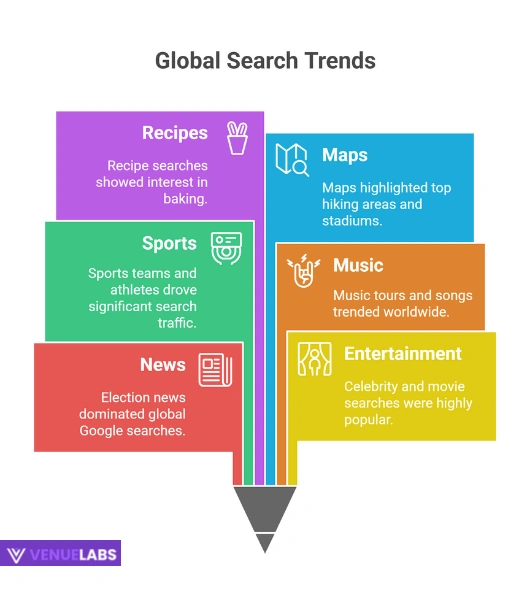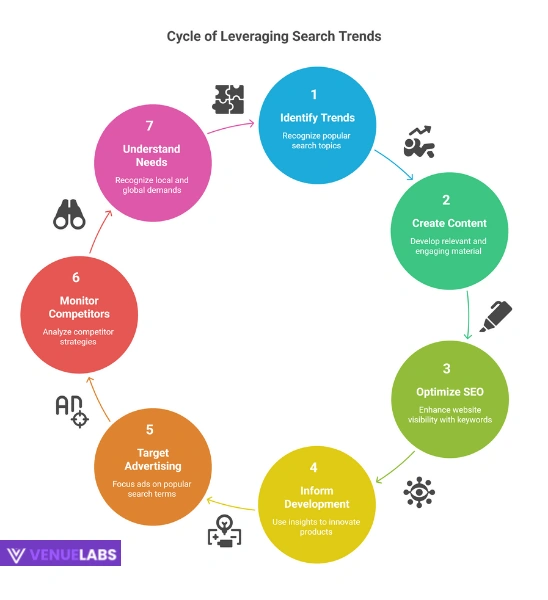Have you ever wondered what the world is thinking? What questions are people asking, what products are they seeking, and what events truly capture global attention? Google, the undisputed king of search, holds the answers.
By diving into the “most searched things on Google statistics 2025,” we unlock invaluable insights into human curiosity, societal shifts, and the emerging trends that shape our digital lives.
This comprehensive guide helps you understand these powerful statistics and shows you exactly how you can use them to your advantage, whether you are a business owner, a content creator, or simply a curious individual.
Understanding what people search for on Google is not just about raw numbers; it is about grasping the underlying intent. It reveals our collective interests, our needs, and even our anxieties.
For instance, the consistent high volume for “weather” tells us about our daily practical needs, while the surge in “election results” highlights our engagement with civic processes.
As we move into 2025, these patterns continue to evolve, reflecting a dynamic and interconnected world.
The Global Search Landscape: What Captures the World’s Attention?
Globally, a few titans consistently dominate Google searches. These are the platforms and services that have become integral to our daily routines. YouTube, for example, reigns supreme with an astounding 1.1 billion searches.
This highlights our insatiable appetite for video content – from entertainment and education to tutorials and news. Following closely, WhatsApp Web, with 487.9 million searches, underscores the global reliance on instant messaging for personal and professional communication.
Social media platforms like Facebook (651.9 million) and Instagram (387.3 million) continue to hold massive sway, demonstrating our need for connection, sharing, and digital communities.
Amazon (369.0 million) consistently ranks high, reflecting the global shift towards online shopping and the convenience it offers. Tools like Gmail (367.1 million) and Google Translate (284.4 million) are essential utilities, enabling communication and breaking down language barriers across continents.
Let’s take a closer look at the top global searches, giving you a clearer picture of what the world is actively seeking:
Top 20 Most Searched Things on Google Globally (September 2025)

| Rank | Google Search Term | Volume (Millions) | Intent |
| 1 | YouTube | 1.1 Billion | Navigational |
| 2 | 651.9 | Navigational | |
| 3 | WhatsApp Web | 487.9 | Navigational |
| 4 | Translate | 413.1 | Navigational, Transactional |
| 5 | 387.3 | Navigational | |
| 6 | Amazon | 369.0 | Navigational |
| 7 | Gmail | 367.1 | Navigational, Transactional |
| 8 | 350.0 | Navigational | |
| 9 | Google Translate | 284.4 | Navigational |
| 10 | Weather | 283.8 | Navigational |
| 11 | Cricbuzz | 259.0 | Navigational |
| 12 | IG | 215.3 | Navigational |
| 13 | Traductor | 212.0 | Navigational |
| 14 | Clima | 201.4 | Informational |
| 15 | ChatGPT | 161.0 | Informational, Navigational |
| 16 | Satta King | 151.3 | Navigational |
| 17 | Canva | 140.7 | Navigational |
| 18 | Google Maps | 134.7 | Navigational |
| 19 | 132.1 | Navigational | |
| 20 | 131.2 | Informational, Navigational |
This table shows a clear pattern: people often search for specific websites (navigational intent), daily information (weather), and tools that simplify their lives (translate, ChatGPT).
The inclusion of “ChatGPT” with a substantial 161.0 million searches highlights the growing impact of artificial intelligence in our everyday tasks, from creative writing to complex problem-solving. It demonstrates a widespread curiosity and adoption of AI technologies.
The American Search Story: What Matters Most in the US?
While global trends offer a broad view, understanding regional differences provides crucial insights. In the United States, similar themes emerge, but with some distinct variations.
YouTube also takes the top spot in the US, boasting an impressive 1.1 billion searches, reinforcing its universal appeal. However, Amazon secures a strong second place with 80.25 million searches in one dataset and 369 million in another, indicating its immense presence in the American consumer landscape.
The slight discrepancy in figures across sources highlights the dynamic nature of search data and the importance of looking at multiple perspectives. Facebook, Gmail, and Wordle consistently rank high, indicating a blend of social interaction, communication needs, and popular culture engagement.
Also read about: Google Searches Statistics
Top 15 Most Searched Things on Google in the US (September 2025)
| Rank | Google Searched Term | Search Volume (Millions) | Intent |
| 1 | YouTube | 1.1 Billion | Navigational |
| 2 | 651.9 | Navigational | |
| 3 | WhatsApp Web | 487.9 | Navigational |
| 4 | Translate | 413.1 | Navigational, Transactional |
| 5 | 387.3 | Navigational | |
| 6 | Amazon | 369.0 | Navigational |
| 7 | Gmail | 367.1 | Navigational, Transactional |
| 8 | 350.0 | Navigational | |
| 9 | Google Translate | 284.4 | Navigational |
| 10 | Weather | 283.8 | Navigational |
| 11 | Cricbuzz | 259.0 | Navigational |
| 12 | IG | 215.3 | Navigational |
| 13 | Traductor | 212.0 | Navigational |
| 14 | Clima | 201.4 | Informational |
| 15 | ChatGPT | 161.0 | Informational, Navigational |
This table shows strong parallels with global trends, with social media, e-commerce, and utility tools forming the backbone of US searches.
However, terms like “Wordle” and various sports-related searches like “NFL” and “NBA” feature more prominently, reflecting specific cultural interests within the United States.
The high search volume for “ChatGPT” in the US also points to a significant uptake of AI tools within the American market, mirroring the global trend but perhaps with a stronger emphasis on integration into daily work and personal productivity.
The Questions People Ask: Unpacking Informational Search Intent
Beyond simply looking for websites, people turn to Google with questions. These “informational” searches offer a deep dive into our collective curiosities and pressing needs. The most Googled question worldwide, “What is my IP?”, with 2.87 million searches, highlights a common technical need. This shows that people often seek practical solutions and explanations for everyday digital issues.
Other top questions reveal a mix of entertainment, general knowledge, and current events. “What to watch?” (1.86 million searches) speaks to our constant quest for entertainment, while the intriguing “What dinosaur has 500 teeth?” (1.77 million searches) demonstrates a fascination with obscure facts.
Crucially, questions about elections, such as “Who won the election 2024?” (1.51 million searches), underscore our engagement with political processes and the desire for immediate answers regarding significant events.
Top 10 Most Googled Questions Worldwide (September 2025)

| Ranking | Google Search Term | Volume (Millions) |
| 1 | What is my IP | 2.87 |
| 2 | What to watch | 1.86 |
| 3 | What dinosaur has 500 teeth | 1.77 |
| 4 | Who won the election 2024 | 1.51 |
| 5 | Where is my train | 0.94 |
| 6 | Who won the election | 0.93 |
| 7 | What the font | 0.91 |
| 8 | How many weeks in a year | 0.87 |
| 9 | How to vote lok sabha | 0.87 |
| 10 | When is mother’s day 2024 | 0.78 |
In the United States, election-related questions dominate, with “Who won the 2024 election?” reaching 1.1 million searches. This indicates a heightened focus on domestic political outcomes.
“What to watch?” remains a strong contender, along with the popular “What dinosaur has 500 teeth?”, indicating a continued blend of practical, entertainment, and curiosity-driven searches.
Also read about: Voice Search Statistics
Top 10 Most Googled Questions in the United States (September 2025)
| Rank | Keyword | Volume (Millions) |
| 1 | Who won the election 2024 | 1.11 |
| 2 | What to watch | 0.93 |
| 3 | Who won the election | 0.866 |
| 4 | What dinosaur has 500 teeth | 0.733 |
| 5 | What is my ip | 0.73 |
| 6 | When is mother’s day 2024 | 0.587 |
| 7 | Who is winning the election | 0.548 |
| 8 | How many weeks in a year | 0.491 |
| 9 | When is father’s day 2024 | 0.44 |
| 10 | How to vote in the us | 0.429 |
The presence of “Project 2025” in US questions with 0.381 million searches shows a specific political or social initiative generating significant public interest and inquiry. This type of search highlights how users actively seek to understand complex topics and ongoing developments.
Trending Now: The Hot Topics of 2024 and Beyond
Beyond consistent high-volume searches, trending topics capture sudden surges in public interest. These trends often reflect major global events, cultural phenomena, and breaking news.
In 2024, major sporting events clearly dominated global trends, with “Copa América,” “UEFA European Championship,” and “ICC Men’s T20 World Cup” leading the pack. This confirms the immense global passion for sports and its power to drive collective search behavior.
Political events also generate significant buzz. The “U.S. Election” was the top trending news topic, and “Donald Trump” emerged as the most searched person globally. This indicates that political narratives and key figures continue to command widespread attention, especially during election years.
Top Trending Google Searches Globally (2024 Recap)
| Rank | Searches |
| 1 | Copa América |
| 2 | UEFA European Championship |
| 3 | ICC Men’s T20 World Cup |
| 4 | India vs England |
| 5 | Liam Payne |
| 6 | Donald Trump |
| 7 | India vs Bangladesh |
| 8 | iPhone 16 |
| 9 | Olympics |
| 10 | Catherine, Princess of Wales |
In the United States, the “Election” was the most trending Google query, once again emphasizing the national focus on politics. “Donald Trump” and “Connections” (a popular game) rounded out the top three, showcasing a mix of serious news and engaging entertainment.
The inclusion of “Hurricane Milton tracker” highlights the immediate and practical nature of some trending searches, as people seek real-time information during critical events.
Trending Google Searches in the United States by Category (2024 Recap)

| Category | Google Search |
| News | Election |
| People | Donald Trump |
| Passings | Toby Keith |
| Actors | Katt Williams |
| Celebrity Duos | Blake Shelton and Gwen Stefani |
| Movies | Inside Out 2 |
| Performance | Raygun full performance |
| TV Shows | Griselda |
| Athletes | Mike Tyson |
| Sports Teams | New York Yankees |
| Workouts | Somatic workout |
| Musicians | Usher |
| Music Tours | Sweat Tour |
| Songs | Not Like Us – Kendrick Lamar |
| Recipe | Olympics chocolate muffins |
| Games | Connections |
| Internet Theory | Burnt toast theory |
| Hum to Search: Trending Songs | Beautiful Things – Benson Boone |
| Google Maps: Top Hiking Areas | Dater Mountain Nature Park, Sloatsburg, New York |
| Google Maps: Top Stadiums | Madison Square Garden, New York, New York |
| Google Maps: Top Visitor Attraction | Sphere, Las Vegas, Nevada |
This detailed breakdown shows how diverse trending topics can be, from individual celebrities to specific internet theories like “Burnt toast theory.” This variety offers a treasure trove of content ideas for creators and marketers.
Decoding Search Intent: The Key to Unlocking Value
Understanding “search intent” is crucial for anyone wanting to leverage these statistics. It helps you tailor your content, products, or services to exactly what people are looking for. Semrush, a leading SEO tool, categorizes intent into four types:
- Navigational: The user wants to reach a specific website (e.g., “YouTube,” “Amazon”).
- Informational: The user wants to learn something (e.g., “What dinosaur has 500 teeth?,” “How to tie a tie”).
- Commercial: The user is researching options or comparing brands, with an eventual purchase in mind (e.g., “best laptops 2025,” “restaurants near me”).
- Transactional: The user is ready to buy or perform a specific action (e.g., “buy iPhone 16,” “book flight to London”).
Most of the top Google searches fall into navigational or informational categories. While these terms generate massive traffic, ranking for them is incredibly difficult due to high competition.
That’s where “Keyword Difficulty” (KD) comes into play. KD, often scored from 0 to 100 by tools like Semrush, tells you how hard it is to rank for a particular keyword. Higher scores mean tougher competition, often dominated by established giants.
Understanding Keyword Difficulty (KD) Scores:
| KD Score Range | Difficulty Level | Explanation |
| 0–14 | Very Easy | Even brand new pages can rank quickly. |
| 15–29 | Easy | Requires some effort, but very doable for new sites. |
| 30–49 | Possible | You need high-quality, optimized content. |
| 50–69 | Difficult | Bring backlinks and established authority. |
| 70–84 | Hard | Competitive niches, serious SEO strategies are essential. |
| 85–100 | Very Hard | Only top-tier, authoritative sites (like Amazon) can compete. |
For most businesses and content creators, focusing on “easy” or “possible” keywords, even if they have lower search volumes, can yield better results. You can build authority over time and then target more difficult terms.
How You Can Use These Statistics for Your Benefit

Now that you understand what people are searching for, how can you use this knowledge to your advantage?
- For Content Creators and Bloggers:
- Identify Content Gaps: If “what to watch” is a top question, create content recommending movies, TV shows, or streaming guides. If “how to tie a tie” is popular, produce a step-by-step video or blog post.
- Leverage Trending Topics: Keep an eye on Google Trends. When “iPhone 16” trends, create reviews, comparisons, or accessory guides. When elections or major sports events trend, develop timely analytical content.
- Answer Specific Questions: The “most Googled questions” are direct content ideas. Each question is a potential blog post, video, or FAQ section for your website.
- For Businesses and Marketers:
- Optimize Your Website (SEO): If your product relates to a highly searched term, make sure your website content uses those keywords naturally. For example, if you sell home goods, ensure your product descriptions and blog posts incorporate terms like “amazon” (as in, “available on Amazon” or “compare to Amazon’s selection”) or specific product categories.
- Inform Product Development: High searches for “ChatGPT” or “AI” suggest a market hungry for AI-powered solutions. If you are in tech, consider how you can integrate AI into your offerings.
- Targeted Advertising: Use popular search terms to inform your paid advertising campaigns. If “restaurants near me” is common, target your local restaurant ads effectively.
- Monitor Competitors: See what your competitors rank for in these popular searches. This can reveal their strategy and help you find your niche.
- Understand Local Needs: For brick-and-mortar businesses, localized searches like “food near me” or “restaurants near me” are critical. Optimize your Google My Business profile and local SEO to capture this traffic.
- For Everyone Else (Personal Use):
- Stay Informed: Understanding search trends helps you keep a pulse on what’s happening in the world, from major news to popular culture.
- Learn New Skills: If “how to make money online” is a frequent question, explore the content that ranks well for it to gain insights.
- Connect with Communities: Observing what platforms (YouTube, Facebook, Instagram) and games (Wordle, Connections) are popular can help you understand where to find communities with shared interests.
What Users Are Asking on Quora and Reddit
To truly capture the pulse of the internet, we must look beyond pure search volume and delve into the conversations happening in online communities like Quora and Reddit. These platforms often reveal deeper user intent, unmet needs, and emerging questions that might not yet show up in top search statistics.
Here are some current themes and questions users are discussing on Quora and Reddit related to “most searched things on Google statistics 2025”:
- “How accurate are these 2025 predictions for Google searches, given the rapid pace of AI development?”
- Users are increasingly aware of how AI tools like ChatGPT are changing search behavior. They question whether traditional keyword volume metrics fully capture the nuance of AI-assisted queries or multi-modal searches (e.g., image searches, voice searches). There’s a strong sentiment that how we search is evolving, not just what we search for.
- “What ‘long-tail’ keywords related to these broad topics (e.g., YouTube, Amazon) offer the best SEO opportunities for small businesses in 2025?”
- Entrepreneurs and content creators are always looking for niches. They understand that competing for “YouTube” is impossible, but they want to know what specific, less competitive phrases within that broad category they can target (e.g., “YouTube tutorial for beginners 2025,” “best YouTube channels for learning coding”).
- “Are there any surprising regional variations in search trends that suggest new market opportunities for niche products?”
- Beyond the top 100, users are curious about hyper-local or culturally specific search terms that could indicate untapped markets. For instance, the presence of terms like “Cricbuzz” and “Satta King” globally points to specific regional interests (cricket, lottery) that are massive in those areas, even if less prominent in the US top 100.
- “With the rise of TikTok and short-form video, how will this impact YouTube’s dominance in search by late 2025?”
- While YouTube still leads, many users speculate about the long-term impact of alternative platforms on traditional search. They wonder if search engines will start indexing more short-form video content directly or if platforms like TikTok will become primary search engines for younger demographics.
- “What new ‘utility’ searches are emerging that aren’t just ‘weather’ or ‘translate’ but reflect new digital habits?”
- Beyond common tools, people are looking for things like “AI image generator free,” “prompt engineering tips,” “VPN for streaming,” or “best productivity apps 2025.” These reflect a more technologically savvy user base seeking tools to enhance their digital lives.
These discussions highlight a critical insight: users are not just consuming information; they are actively trying to understand the mechanisms of search and how new technologies are reshaping it. This offers content creators an opportunity to provide educational content on SEO, AI’s impact on search, and emerging digital trends.
FAQs About Most Searched Things on Google Statistics
1. Why is YouTube consistently the most searched term globally and in the US?
YouTube consistently ranks as the most searched term because it serves as a central hub for video content, fulfilling a wide range of user needs from entertainment and education to news and tutorials. Its vast library, user-friendly interface, and widespread integration across devices make it a go-to destination for visual information and leisure, driving massive navigational search volume as users directly type “YouTube” into Google to access the platform.
2. How do major events like elections or sporting championships impact Google search trends?
Major events like elections or sporting championships create significant spikes in Google search trends by generating immediate and widespread public interest. People actively search for real-time information such as “election results,” “who won the game,” “match schedules,” and “player statistics.” These events often lead to trending searches that last for days or weeks, demonstrating how real-world happenings directly translate into massive surges in informational and navigational queries.
3. What is "search intent," and why is it important for someone using these statistics?
Search intent refers to the underlying reason or goal a user has when typing a query into a search engine. It is crucial for anyone using these statistics because it helps you understand why people are searching for certain terms. By knowing if someone is looking for a specific website (navigational), trying to learn something (informational), researching a purchase (commercial), or ready to buy (transactional), you can create highly relevant content, products, or services that directly address their needs and increase your chances of appearing in their search results.
4. How can a small business use the "most searched things on Google" data to grow?
A small business can use this data by identifying niche opportunities within broader popular topics. Instead of trying to rank for highly competitive terms like “Amazon,” they can target specific “long-tail” keywords that have lower search volumes but higher relevance to their products or services (e.g., “handmade jewelry on Amazon,” “sustainable amazon alternatives”). They can also create informational content that answers common questions related to their industry, optimize for local searches like “restaurants near me,” and use trending topics to create timely marketing campaigns.
5. What new search behaviors are emerging due to AI tools like ChatGPT, and how might they affect 2025 statistics?
AI tools like ChatGPT are introducing new search behaviors by enabling users to get direct answers to complex questions without needing to navigate multiple websites. This might lead to a shift from traditional keyword searches to more conversational queries. While some “informational” searches might decrease as AI provides immediate answers, new “navigational” searches for AI tools themselves (like “ChatGPT login”) or “commercial” searches for AI-enhanced products and services will likely increase, influencing the overall “most searched things on Google statistics 2025.”
Also Read:
- Personalization Statistics
- Microsoft Teams Statistics
- Chatbots Statistics
- Infographics Statistics
- Android Statistics
Conclusion: Staying Ahead in a Dynamic Search World
The “most searched things on Google statistics 2025” offer a fascinating window into our collective digital behavior. From the consistent dominance of platforms like YouTube and Amazon to the dynamic shifts driven by major events and emerging technologies like AI, search trends are a mirror of human activity.
By understanding global and regional patterns, decoding search intent, and staying attuned to the conversations happening in online communities, you can unlock powerful insights.
Whether you are building a business, crafting compelling content, or simply seeking to understand the world around you, these statistics provide a valuable compass.
Remember, the digital landscape is constantly evolving, so staying informed about these trends is not just an advantage – it is a necessity. Keep learning, keep adapting, and keep searching!
Sources: Ahrefs, Google Trend, Statista
